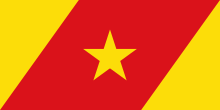Menjarna Shenkora
Menjarna Shenkora (Amharic: ምንጃር ሸንኮራ"Menjar and Shenkora") is one of the woredas in the Amhara Region of Ethiopia. It is named in part after a historic district of Shewa, Menjar, which was the southernmost district of Shewa and near the location of the modern woreda.[2] Located at the southern end of the Semien Shewa Zone, Menjarna Shenkora is bordered on the east, south and west by the Oromia Region, on the northwest by Hagere Mariamna Kesem, and on the northeast by Berehet; the Germama (or Kesem) river forms the boundary between this woreda and Hagere Mariamna Kesem and Berehet. The administrative center of this woreda is Arerti; other towns in the woreda include Balchi and Eranbuti.
Menjarna Shenkora ምንጃር ሸንኮራ | |
|---|---|
Woreda | |
 Flag | |
| Zone | Semien Shewa |
| Region | Amhara Region |
| Area | |
| • Total | 1,509.93 km2 (582.99 sq mi) |
| Population (2012 est.) | |
| • Total | 140,639 |
This woreda is served by the Addis Ababa - Djibouti Railway with a station at Malka Jilo. It is the only woreda in the Amhara Region with a train station.
Demographics
Based on the 2007 national census conducted by the Central Statistical Agency of Ethiopia (CSA), this woreda has a total population of 128,879, an increase of 29.65% over the 1994 census, of whom 66,918 are men and 61,961 women; 12,237 or 9.49% are urban inhabitants. With an area of 1,509.93 square kilometers, Menjarna Shenkora has a population density of 85.35, which is less than the Zone average of 115.3 persons per square kilometer. A total of 29,359 households were counted in this woreda, resulting in an average of 4.39 persons to a household, and 28,221 housing units. The majority of the inhabitants practiced Ethiopian Orthodox Christianity, with 94% reporting that as their religion, while 5.73% of the population said they were Muslim.[3]
The 1994 national census reported a total population for this woreda of 99,402 in 17,787 households, of whom 51,537 were men and 47,865 were women; 8,378 or 8.43% of its population were urban dwellers. The three largest ethnic groups reported in Menjarna Shenkora were the Amhara (93.78%), the Oromo (3.11%), and the Argobba (2.65%); all other ethnic groups made up 0.46% of the population. Amharic was spoken as a first language by 96.93%, and Oromiffa was spoken by 2.76%; the remaining 0.31% spoke all other primary languages reported. The majority of the inhabitants practiced Ethiopian Orthodox Christianity, with 94.74% reporting that as their religion, while 5.15% were Muslim.[4]
Notes
- Geohive: Ethiopia Archived 2012-08-05 at the Wayback Machine
- Journals of the Rev. Messrs. Isenberg and Krapf, Missionaries of the Church Missionary Society, Detailing their proceedings in the kingdom of Shoa, and journeys in other parts of Abyssinia, in the years 1839, 1840, 1841 and 1842, (London, 1843), p. 288
- Census 2007 Tables: Amhara Region Archived 2010-11-14 at the Wayback Machine, Tables 2.1, 2.4, 2.5, 3.1, 3.2 and 3.4.
- 1994 Population and Housing Census of Ethiopia: Results for Amhara Region, Vol. 1, part 1 Archived 2010-11-15 at the Wayback Machine, Tables 2.1, 2.7, 2.10, 2.13, 2.17, Annex II.2 (accessed 9 April 2009)